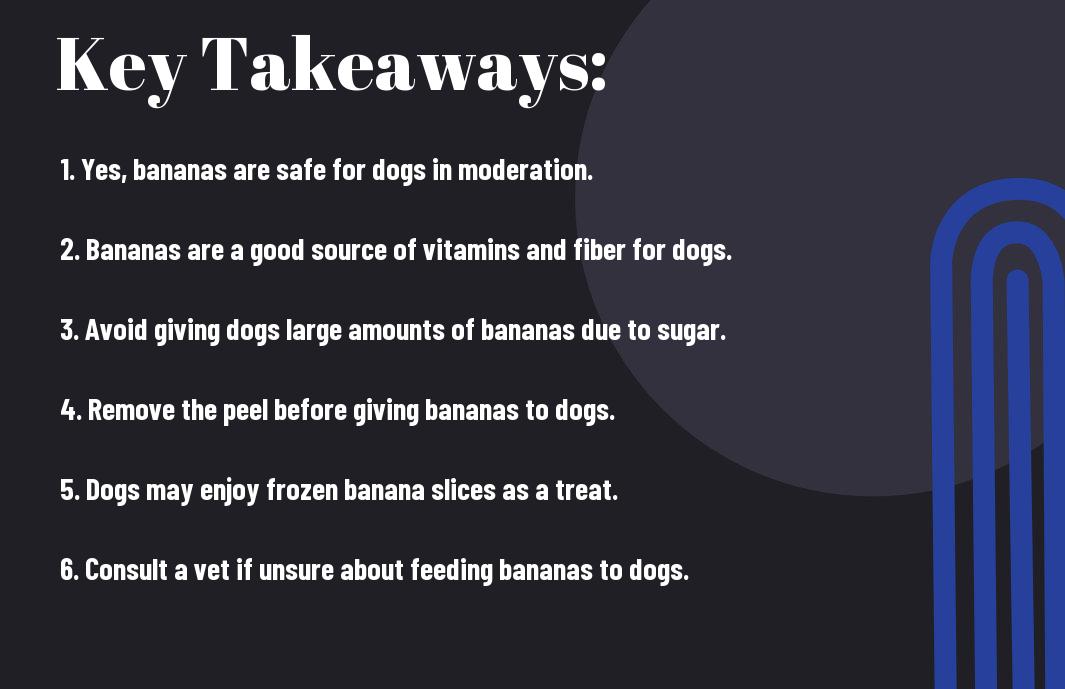Okay, let’s talk bananas. You may have wondered if this tropical fruit is safe for your furry friend to enjoy. Bananas are packed with important nutrients like potassium and vitamins, but can dogs eat them without any negative effects? In this article, we’ll investigate into the topic of whether bananas are okay for your four-legged companion and what you need to know before sharing this treat with your pup.
Key Takeaways:
- Bananas are safe for dogs: Bananas are a healthy treat for dogs in moderation. They are low in cholesterol and fat, making them a good snack option.
- Rich in vitamins and nutrients: Bananas are packed with necessary nutrients like potassium, vitamin B6, and vitamin C, which can benefit your dog’s overall health.
- Feed in moderation: While bananas are safe for dogs, they should be given in moderation to prevent gastrointestinal issues due to the fruit’s high sugar content.
Nutritional Value of Bananas
Carbohydrates and Fiber
Bananas are a great source of carbohydrates and fiber for your dog. Carbohydrates provide a quick and easily accessible source of energy, which is vital for your furry friend’s overall health and vitality. The fiber content in bananas can also aid in digestion and promote a healthy gut, preventing issues such as constipation.
Vitamins and Minerals
Bananas are packed with vital vitamins and minerals that can benefit your dog’s well-being. They are rich in potassium, which is crucial for maintaining proper muscle function and preventing electrolyte imbalances. Bananas also contain vitamins C and B6, which can help boost your dog’s immune system and support overall cognitive function.
Value: In addition to the vitamins and minerals mentioned above, bananas also provide antioxidants that can help reduce inflammation and protect your dog’s cells from damage. Including bananas in your dog’s diet in moderation can be a nutritious and tasty addition to their meals.
Can Dogs Digest Bananas?
Dog’s Digestive System
Assuming you’re wondering whether your furry friend can actually digest bananas, the answer is yes, they can. Dogs have a different digestive system compared to humans, which allows them to break down and absorb a variety of foods, including fruits like bananas.
Potential Issues with Banana Consumption
Any concerns about feeding your dog bananas are typically related to the quantity consumed. While bananas are generally safe for dogs to eat in moderation, feeding them large quantities can lead to gastrointestinal issues. An excessive intake of fruits, including bananas, may cause stomach upset, bloating, or even diarrhea in some dogs.
An important thing to keep in mind is that the high sugar content in bananas can be problematic for dogs, especially those with underlying health conditions like diabetes. If your dog has any health concerns or dietary restrictions, it’s always best to consult with your veterinarian before adding bananas to their diet.
Health Benefits of Bananas for Dogs
Now, let’s examine into the numerous health benefits that bananas can offer to your furry friend.
Aiding Digestion
Aiding digestion is one of the key benefits that bananas can provide for your dog. Bananas are rich in fiber, which can help regulate your dog’s digestive system and alleviate any issues with constipation. Additionally, the smooth texture of bananas can be soothing for your dog’s stomach, making them an ideal snack if your pup is experiencing gastrointestinal issues.
Supporting Healthy Bones
For supporting healthy bones in your dog, bananas are a great natural source of potassium. Potassium is important for maintaining strong bones and muscles in dogs. By including bananas in your dog’s diet, you can help promote bone health and prevent conditions like osteoporosis.
Additionally, bananas contain vitamin C, which plays a crucial role in the production of collagen, a protein important for maintaining healthy bones and joints.
Antioxidant Properties
For antioxidant properties, bananas are packed with important vitamins and minerals, including vitamin C and B6. These antioxidants help combat free radicals in your dog’s body, reducing the risk of chronic diseases and promoting overall health. By including bananas in your dog’s diet, you can boost their immune system and protect their cells from damage.
Bananas also contain carotenoids, which have been linked to reducing inflammation and supporting heart health in dogs.
Potential Risks and Side Effects
Choking Hazards
Hazards can arise from feeding your dog whole bananas, especially if they are not sliced or mashed properly. Large pieces of banana can present a choking hazard to your furry friend, especially small dogs or those who tend to gulp their food without chewing thoroughly. To prevent choking incidents, it is best to cut the banana into small, bite-sized pieces before offering it to your dog.
Allergic Reactions
Potential allergic reactions to bananas in dogs are rare but can occur. If your dog has never eaten bananas before, it’s important to introduce them gradually into their diet and observe for any signs of an allergic reaction. Symptoms may include itching, redness, swelling, or gastrointestinal issues such as vomiting or diarrhea. If you notice any of these signs, consult your veterinarian immediately.
For dogs with known food allergies, it’s crucial to consult with your vet before adding bananas to their diet. Allergic reactions can vary from mild to severe, and it’s always best to err on the side of caution when introducing new foods to your pet.
Overconsumption and Weight Gain
Overindulging in bananas can lead to weight gain in dogs, as bananas are naturally high in sugar and carbohydrates. While bananas are a healthy snack in moderation, too much can contribute to an increase in your dog’s calorie intake, potentially leading to obesity over time.
It’s important to consider your dog’s overall diet and calorie needs when adding bananas as a treat. Be mindful of, moderation is key in ensuring that your dog maintains a healthy weight and diet. Be mindful of portion sizes and monitor your dog’s weight to prevent any unwanted weight gain.
How to Feed Bananas to Dogs
Fresh vs. Ripe Bananas
Not all bananas are created equal when it comes to your furry friend. While both fresh and ripe bananas are safe for dogs to eat, there are some differences that you should be aware of. Fresh bananas are easier for dogs to digest compared to ripe bananas, as they are less sugary and starchy. If your dog has a sensitive stomach, fresh bananas may be the better option for them.
Banana Slices or Mashed Bananas
One popular way to feed bananas to dogs is by slicing them up or mashing them before offering them as a treat. Slicing bananas into bite-sized pieces can make it easier for your dog to eat and digest. Alternatively, mashing bananas can create a creamy texture that some dogs may find more palatable.
Feed your dog banana slices or mashed bananas in moderation to prevent any digestive issues. Recall, too much of a good thing can sometimes lead to stomach upset, so it’s best to start with small portions and monitor how your dog reacts.
Mixing with Other Foods
Ripe bananas can be a great addition to your dog’s diet when mixed with other dog-friendly ingredients. Mixing mashed ripe bananas with a dollop of peanut butter or blending it with plain yogurt can create a tasty and healthy snack for your furry friend. Just be sure to avoid adding any additional sweeteners or ingredients that may be harmful to dogs.
Mixing bananas with other foods can also help enhance the nutritional value of your dog’s diet. You can get creative with combinations to keep your dog interested in their treats while providing them with a variety of nutrients.
Alternatives to Bananas for Dogs
Other Fresh Fruits
Dogs can enjoy a variety of fresh fruits as alternatives to bananas. Apples, blueberries, and watermelon are safe options that provide necessary nutrients and a sweet taste that your furry friend will enjoy. Remember to remove any seeds or pits from fruits before feeding them to your dog to avoid potential choking hazards.
Vegetables and Legumes
Fruits are not the only healthy treat options for your dog. Vegetables like carrots, green beans, and sweet potatoes are excellent choices that are low in calories and high in fiber. Legumes such as peas and lentils can also be a nutritious addition to your dog’s diet, providing protein and necessary minerals.
The key is to offer a variety of fresh foods to ensure your dog receives a balanced diet that meets their nutritional needs.
Commercial Dog Treats
The pet industry offers a wide range of commercial dog treats that are specially formulated to meet your dog’s dietary requirements. These treats come in various flavors, textures, and sizes, making them a convenient and tasty option for rewarding your furry companion.
For instance, you can find treats that cater to specific dietary needs, such as grain-free or hypoallergenic options, ensuring that there is something suitable for every dog, including those with food sensitivities.
To wrap up
Upon reflecting on the information presented in this article, you should now understand that bananas can be a healthy treat for your dog when given in moderation. With a high nutritional value and a variety of health benefits, bananas can be a great addition to your furry friend’s diet. Remember to always consult with your veterinarian before introducing any new foods to your dog’s diet, as individual sensitivities and allergies can vary.
FAQ
Q: Can dogs eat bananas?
A: Yes, dogs can eat bananas in moderation. Bananas are a healthy and nutritious treat for dogs, packed with vital vitamins and minerals.
Q: Are bananas good for dogs?
A: Bananas are a good source of potassium, vitamins C and B6, and fiber, which can benefit a dog’s digestive health and overall well-being.
Q: How should bananas be served to dogs?
A: Bananas should be given to dogs in moderation and preferably in small, bite-sized pieces to prevent choking hazards. Remove the peel before offering them to your furry friend.
Q: Can bananas cause any health issues in dogs?
A: While bananas are generally safe for dogs, feeding them too much can lead to digestive issues due to their high sugar content. It is important to consult with your veterinarian before adding new foods to your dog’s diet.
Q: What are the benefits of feeding bananas to dogs?
A: Bananas can serve as a healthy alternative to store-bought treats, offering dogs a natural source of vitamins and minerals that can support their overall health and provide a tasty snack option.
Are strawberries toxic for dogs
Demystifying Anal Gland Issues in Dogs: Your Comprehensive Guide from the American Kennel Club




